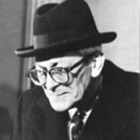
James Jesus Angleton
When the Cold War ended, I decided to change my investigative interest from the spy war to venue of even more subtle intrigue-- Hollywood.
Nevertheless, how could I resist reviewing the memoirs of the KGB officer who had managed the recruitment of two of the great successes in the war of the moles--- Aldrich Ames, from the CIA, and Robert Hanssen, from the FBI. My review of Spy Handler appears in today's Wall Street Journal.
Victor Cherkashon, the spymaster-turned-memorist, it turns out apparently maintained a continuing interest in meeting his former rivals. A group of former American officers are invited to meet with him in Virginia in January 2005. The invitation from the Spy Museum in Washington advises:
"Legendary senior KGB officer, Victor Cherkashin, is flying in from Moscow for a dinner date - with you. Be one of only 20 guests at the table with the man whose incredible KGB career spanned thirty-eight years, from Stalin's death in 1953 to the fall of the Soviet Union in 1991. It was
Cherkashin who handled two of America's most dangerous traitors, Aldrich Ames and Robert Hanssen; Cherkashin who tracked Oleg Penkovsky for spying for the U.S.; and Cherkashin who holds the secrets about KGB undercover operatives and operations to this day! Following his opening remarks, you'll toast to the end of the Cold War with wine and then share a delicious three-course meal from Zola. This is truly a once-in-a-lifetime
opportunity to dine and dish with an extraordinary spymaster."
In his book, Spy Handler, this ex-KGB recruiter clearly enjoys taunting the CIA. According to him. James Jesus Angleton, the CIA's long-time counterintelligence chief, suffered from"paranoia" because he suspected that the CIA’s Soviet Russia division had been deeply penetrated by a KGB mole. The irony in this accusation is that Cherkashin himself had recruited a mole in the CIA's Soviet Russia Division-- Aldrich Ames-- who had compromised over 100 CIA operations in Russia. To call Angleton paranoid for suspecting such a possibility is the equivalent of a stalker accusing his victim of being paranoid for believing he is being stalked. Cherkashin's memoir demonstrates of course that Angleton was right after all.
Unfortunately, Jim Angleton is not around to enjoy the exquisite irony of this memoirist (or, for that matter, suspect his motives in arranging a dinner with ex-CIA intelligence officers.) For all his shortcomings, Angleton remains the most extraordinary intellectual I ever met in Washington. My encounters with him can be read in my cyber diary.
While on the subject of historic vindication, there is an extraordinary cover story on Michael Milken in Fortune (November 23, 2004) by Cora Daniels. In it, Rudy Giuliani, the man who helped send Milken to prison, now says "I realize now that I didn't know him then. The man I now know is able to do tremendous things. He took the tremendous talent he had in business and is using it to fight prostate cancer. What more could you ask for?"

